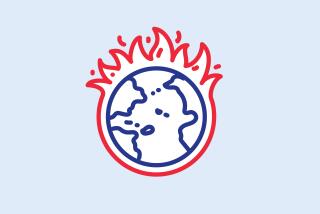It’s ‘Big Sugar’ Vs. Big Swamp in Everglades Cleanup Vote : A close, bitterly contested campaign asks if growers should be taxed to help restore polluted wetlands.
- Share via
MIAMI — For many Florida voters, the choice for president may only be the second most-intriguing question decided on election day. Also on the ballot are three related initiatives that would amend the state Constitution to impose a penny-a-pound tax on the sugar industry to clean up pollution in the Everglades.
The battle between so-called “Big Sugar” interests and environmentalists over who is to pay for restoration of the vast, endangered wetland ecosystem has evolved into a bitterly contested campaign that has become the most expensive in Florida’s history. Each side has spent at least $13 million on advertising alone, with polls continuing to show the outcome in doubt.
“It’s an awesome, unprecedented amount of money for an environmental issue,” said Arlie Schardt, executive director of the Washington-based Environmental Media Services, a public interest group. “It should bring a lot of people out to the polls.”
On one side of the taxation issue is an organization called Save Our Everglades, bankrolled by a Maryland-based Wall Street commodities broker named Paul Tudor Jones II. Jones, who owns a vacation home in the Florida Keys, has spent about $5 million of his own money to convince voters that the sugar industry is not paying its fair share of a cleanup estimated to cost $2 billion.
If enacted, the proposed tax would raise an estimated $900 million over the next 25 years for Everglades restoration, which includes buying up farmland and taking it out of production.
Over the years, sugar growers have diverted water from the Everglades, used it for irrigation and then pumped that water--laden with phosphorus and other nutrients used as fertilizer--back into the ecosystem. Those nutrients have encouraged the growth of cattails and other exotic plants, which crowd out native species and interfere with the nesting of birds and alligators.
On the other side of the issue are about 130 sugar growers who note they already pay for Everglades restoration as the result of a 1993 agreement with the state and federal government that requires them to provide $322 million over 20 years. Passage of the amendments would put the sugar growers out of business and lead to 40,000 lost jobs, argues Bob Buker, a vice president of U.S. Sugar Corp., one of the largest of the growers farming the muck-lands between Lake Okeechobee and Everglades National Park.
Buker says the fight with environmentalists is not about the Everglades, but about taxation.
Sugar interests tried to have the ballot initiatives declared unconstitutional, arguing that they usurped the powers of taxation and spending reserved for the state Legislature. But last month, the state Supreme Court ruled that the three amendments were constitutional and that the voters should decide.
A Mason-Dixon poll published Thursday said 49% of likely voters favor the tax, 40% oppose it and 11% remain undecided.
Bob Joffee, director of the new survey, said the results indicate a close vote because most voters undecided about an initiative at this point tend to vote no. He added that the language of the tax measures, as well as their placement on the ballot below two complicated, unrelated issues, could also work against their passage.
Between now and the Nov. 5 election, both sides plan to continue spending lavishly on television ads. One ad promoting the measures shows dirty water being pumped from a cane field while a fishing guide in his boat complains: “The water in the Everglades was once clean and clear. Now, it’s so polluted you can’t even see my paddle.”
An ad paid for by the sugar industry’s political action committee shows images of wetlands being bulldozed for development vultures feasting on garbage dumped in the Everglades. A voice-over claims that the proposed tax means that “big polluters won’t pay. But you will.”
More to Read
Sign up for Essential California
The most important California stories and recommendations in your inbox every morning.
You may occasionally receive promotional content from the Los Angeles Times.













